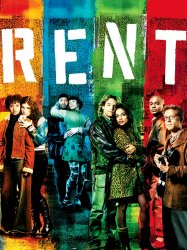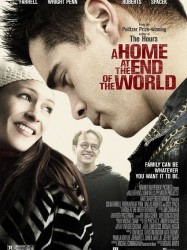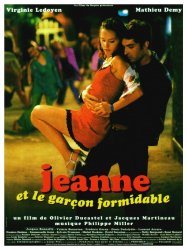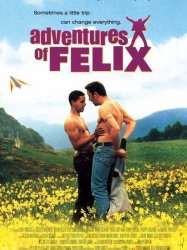Films with theme "Sida et LGBT", sorted by revenue

Philadelphia (1994)
, 2h5Directed by Jonathan Demme
Origin USA
Genres Drama
Themes Medical-themed films, Films about sexuality, LGBT-related films, LGBT-related films, Sida et LGBT, HIV/AIDS in film, LGBT-related film
Actors Tom Hanks, Denzel Washington, Jason Robards, Mary Steenburgen, Antonio Banderas, Joanne Woodward
Andrew Beckett (Tom Hanks) is a Senior Associate at the largest corporate law firm in Philadelphia. Beckett hides his homosexuality and his status as an AIDS patient from the other members of the law firm. On the day Beckett is assigned the firm's newest and most important case, a partner in the firm notices a lesion on Beckett's forehead. Although Beckett attributes the lesion to a racquetball injury, it is actually due to Kaposi's Sarcoma, a form of cancer marked by multiple tumors on the lymph nodes and skin.

The Hours (2002)
, 1h54Directed by Stephen Daldry
Origin USA
Genres Drama
Themes Films about writers, Films about families, Feminist films, Medical-themed films, Films about sexuality, Films about suicide, LGBT-related films, Films about psychiatry, Political films, LGBT-related films, Sida et LGBT, HIV/AIDS in film, LGBT-related film, Lesbian-related films
Actors Meryl Streep, Julianne Moore, Nicole Kidman, Ed Harris, John C. Reilly, Lyndsey Marshal
With the exception of the opening and final scenes, which depict the 1941 suicide by drowning of Virginia Woolf in the River Ouse, the action takes place within the span of a single day in three different years and alternates between them throughout the film. In 1923, Virginia has begun writing the book Mrs Dalloway in her home in the town of Richmond outside London. In 1951, troubled Los Angeles housewife Laura Brown escapes from her conventional life by reading Mrs Dalloway. In 2001, New Yorker Clarissa Vaughan is the embodiment of the novel's title character, as she spends the day preparing for a party she is hosting in honor of her former lover and friend Richard, a poet and author living with AIDS who is to receive a major literary award. Richard tells Clarissa he has stayed alive for her sake, and the award is meaningless because he didn't get it sooner, until he was on the brink of death. She tells him she believes he would have won the award regardless of his illness. Richard often refers to Clarissa as "Mrs. Dalloway" - her namesake - because she distracts herself from her own life the way the Woolf character does.

Dallas Buyers Club (2013)
, 1h57Directed by Jean-Marc Vallée
Origin USA
Genres Drama, Biography, Historical
Themes Medical-themed films, Films about sexuality, LGBT-related films, Transgender in film, LGBT-related films, Sida et LGBT, HIV/AIDS in film, LGBT-related film, Cross-dressing in film
Actors Matthew McConaughey, Jared Leto, Jennifer Garner, Dallas Roberts, Steve Zahn, Jane McNeill
In 1985, Dallas electrician and rodeo cowboy Ron Woodroof is diagnosed with AIDS and given 30 days to live. He initially refuses to accept the diagnosis, but remembers having unprotected sex with an intravenous drug-using prostitute. He is soon ostracized by family and friends, gets fired from his job, and is eventually evicted from his home. At the hospital, he is tended to by Dr. Eve Saks, who tells him that they are testing a drug called zidovudine (AZT), an antiretroviral drug which is thought to prolong the life of AIDS patients—and is the only drug approved by the Food and Drug Administration (FDA) for testing on humans. Saks informs him that in the clinical trials, half the patients receive the drug and the other half are given a placebo, as this is the only way they can determine if the drug is working.

Rent (2005)
, 2h15Directed by Chris Columbus
Origin USA
Genres Drama, Science fiction, Comedy, Musical, Romance
Themes Medical-themed films, Films about music and musicians, Films about sexuality, Théâtre, Bisexuality-related films, LGBT-related films, Musical films, Films based on plays, Films based on musicals, LGBT-related films, Sida et LGBT, HIV/AIDS in film, LGBT-related film, Lesbian-related films, Cross-dressing in film
Actors Anthony Rapp, Adam Pascal, Rosario Dawson, Jesse L. Martin, Wilson Jermaine Heredia, Idina Menzel
On Christmas Eve, 1989, aspiring filmmaker Mark Cohen, and his roommate, Roger Davis, learn that the rent previously waived by their former friend and landlord, Benjamin “Benny” Coffin III, is due. At the same time, their former roommate Tom Collins shows up and gets mugged in an alleyway. Meanwhile, Mark and Roger meet with Benny, who tells them he plans to evict the homeless from the nearby lot and build a cyber studio in its place. He offers them free rent if they can get Maureen, Mark's ex-girlfriend, to cancel her protest against his plans, but they refuse.

Longtime Companion (1989)
, 1h36Directed by Norman René
Origin USA
Genres Drama, Romance
Themes Medical-themed films, Films about sexuality, LGBT-related films, LGBT-related films, Sida et LGBT, HIV/AIDS in film, LGBT-related film
Actors Campbell Scott, Bruce Davison, Mary-Louise Parker, Patrick Cassidy, John Dossett, Stephen Caffrey
Longtime Companion chronicles the first years of the AIDS epidemic as seen through its impact on several gay men and the straight sister of one of them. The film is split into several sections identified by dates.
 , 1h37
, 1h37Directed by Michael Mayer
Origin USA
Genres Drama, Romance
Themes Medical-themed films, Films about sexuality, Bisexuality-related films, LGBT-related films, Teen LGBT-related films, LGBT-related films, Sida et LGBT, HIV/AIDS in film, LGBT-related film
Actors Colin Farrell, Robin Wright, Ryan Donowho, Dallas Roberts, Sissy Spacek, Asia Vieira
Enfant, Bobby Morrow perd successivement son frère en 1967, sa mère en 1973 et son père en 1974. Il est recueilli par la famille de son camarade de classe Jonathan Glover. Bobby et Jonathan entretiennent des relations intimes, puis Jonathan part à l'université de New York tandis que Bobby reste chez les parents de Jonathan dans la banlieue de Cleveland et il devient boulanger. Lorsque les parents de Jonathan partent pour Phoenix en 1982, Bobby rejoint Jonathan qui vit dans l'East Village avec Claire. Claire aime Jonathan et veut un enfant, Jonathan est homosexuel et passe son temps dehors. Finalement Claire tombe amoureuse de Bobby qui est autant attiré par Jonathan que par Claire. À la mort de Ned, le père de Jonathan, le trio se retrouve pour l'enterrement à Phoenix et Claire annonce qu'elle est enceinte. Sur le chemin du retour, elle achète une maison perdue dans la nature à Woodstock où ils s'installent tous les trois. Tandis que Claire élève sa fille Rebecca, Bobby et Jonathan ouvrent un café. Jonathan est atteint de la maladie de Kaposi, Claire vit mal l'intimité de Bobby et Jonathan. Finalement elle quitte la maison au bout du monde avec sa fille pour visiter sa mère à Philadelphie. Bobby et Jonathan comprennent qu'elle ne reviendra pas.

Savage Nights (1992)
, 2h6Directed by Cyril Collard
Origin France
Genres Drama, Biography
Themes Medical-themed films, Films about sexuality, Bisexuality-related films, LGBT-related films, LGBT-related films, Sida et LGBT, HIV/AIDS in film, LGBT-related film
Actors Cyril Collard, Romane Bohringer, Maria Schneider, Claude Winter, Clémentine Célarié, Laura Favali
“I feel I go through life like an American tourist, doing as many towns as possible", explains Jean, a camera man and aspiring film director. Handsome, but self-centered, childish and hedonistic, he has a complicated sex life. He is bisexual and HIV positive. During a casting session he meets Laura, a lively, eighteen-year-old aspiring actress. Captivated by her charm, Jean soon is pursuing her and she quickly falls in love with him. They start a passionate affair. At the same time, the restless Jean pursues a relationship with Samy, a young rugby player. Samy, who has emigrated with his mother and brother from Spain, is unemployed and equally troubled. He is straight and although living with his girlfriend, Marianne, he has no qualms about his homoerotic relationship with Jean, who has a big crush on him.

It's My Party (1996)
, 1h50Directed by Randal Kleiser
Origin USA
Genres Drama
Themes Medical-themed films, Films about sexuality, Films about suicide, LGBT-related films, LGBT-related films, Sida et LGBT, HIV/AIDS in film, LGBT-related film
Actors Eric Roberts, Margaret Cho, Bruce Davison, Lee Grant, Devon Gummersall, George Segal
It's My Party chronicles a two-day party hosted by Nick Stark (Eric Roberts) who, having been diagnosed with progressive multifocal leukoencephalopathy, will fall into a state of mental lapse lasting for months until his death. He decides instead to host a party for his family and friends, at the end of which he will commit suicide by taking Seconal.

A Year Without Love (2005)
, 1h42Origin Argentine
Genres Drama, Biography, Romance
Themes Medical-themed films, Films about sexuality, Bisexuality-related films, LGBT-related films, LGBT-related films, Sida et LGBT, HIV/AIDS in film, LGBT-related film
Actors Juan Minujín, Carlos Echevarría
Pablo is a struggling poet who is living with HIV in Buenos Aires. Over the course of a year he deals with issues relating to his health, his family, his search for love and his developing involvement with leather fetishism.

Jeanne and the Perfect Guy (1998)
, 1h38Directed by Olivier Ducastel, Jacques Martineau
Origin France
Genres Drama
Themes Medical-themed films, Films about music and musicians, Films about sexuality, Musical films, LGBT-related films, Sida et LGBT, HIV/AIDS in film, LGBT-related film
Actors Virginie Ledoyen, Mathieu Demy, Jacques Bonnaffé, Valérie Bonneton, Frédéric Gorny, Michel Raskine
Jeanne papillonne de garçon en garçon, dans l'attente du grand amour. Un jour, elle s'assied dans le métro en face d'Olivier, et c'est le coup de foudre réciproque. Après quelque temps, il lui révèle sa séropositivité.

We Were Here (2011)
, 1h30Origin USA
Genres Documentary
Themes Medical-themed films, Films about sexuality, LGBT-related films, Documentaire sur l'homosexualité, Documentary films about health care, Documentary films about cities, LGBT-related films, Sida et LGBT, HIV/AIDS in film, LGBT-related film
We Were Here documents the coming of what was called the “Gay Plague” in the early 1980s. It illuminates the profound personal and community issues raised by the AIDS epidemic as well as the broad political and social upheavals it unleashed.

The Normal Heart (2014)
, 2h12Directed by Ryan Murphy
Origin USA
Genres Drama, Comedy-drama
Themes Medical-themed films, Films about sexuality, LGBT-related films, Films based on plays, LGBT-related films, Sida et LGBT, HIV/AIDS in film, LGBT-related film
Actors Mark Ruffalo, Julia Roberts, Matt Bomer, Jim Parsons, Alec Baldwin, Taylor Kitsch
It is summer of 1981. Ned Weeks (Mark Ruffalo) is an openly gay writer from New York City who travels to Fire Island Pines on Long Island to celebrate the birthday of his friend Craig Donner (Jonathan Groff) at a house on the beach. Other friends in attendance include Mickey Marcus (Joe Mantello) and the charismatic Bruce Niles (Taylor Kitsch), who has recently begun dating Craig. Craig is young and appears to be in good health. While walking on the beach, however, Craig feels dizzy and collapses. Later, when blowing out the candles on his birthday cake, Craig begins to cough repeatedly.

Adventures of Félix (2000)
, 1h35Directed by Olivier Ducastel, Jacques Martineau
Origin France
Genres Comedy, Comedy-drama
Themes Medical-themed films, Films about sexuality, Transport films, Bisexuality-related films, LGBT-related films, Films about automobiles, Road movies, LGBT-related films, Sida et LGBT, HIV/AIDS in film, LGBT-related film
Actors Sami Bouajila, Ariane Ascaride, Patachou, Pierre-Loup Rajot, Maurice Bénichou, Christiane Millet
Félix, a young gay man of Arab descent, living in Dieppe, is currently unemployed and HIV positive. While cleaning out the apartment of his recent deceased mother, he discovers that the father he never knew is living in Marseilles. Félix decides to hitchhike south to meet him, promising to see his lover Daniel there five days later.

Once More (1988)
, 1h23Directed by Paul Vecchiali
Genres Drama
Themes Medical-themed films, Films about sexuality, LGBT-related films, LGBT-related films, Sida et LGBT, HIV/AIDS in film, LGBT-related film
Actors Florence Giorgetti, Pascale Rocard, Patrick Raynal, Dora Doll, Albert Dupontel, Anne Richard
15 octobre 1978. Louis, un cadre d'une quarantaine d'années qui mène une vie bourgeoise, réalise qu'il ne peut plus continuer à vivre avec son épouse Sybèle. Il n'a pas d'autre femme, pas de liaison : il ne supporte tout simplement plus la vie qu'il mène. Un an plus tard, la rupture est consommée. Louis fait ensuite la connaissance de deux marginaux, dont il se met à partager la vie aventureuse. Plus tard, par l'entremise de ses nouveaux amis, Louis rencontre un homosexuel nommé Frantz : il succombe à ses avances, et en tombe follement amoureux. Au fil du temps qui passe, Louis assume de mieux en mieux sa nouvelle sexualité. Mais déjà, les années 1980 sont là, et le sida, dont les homosexuels sont les premières victimes, fait des ravages.

An Early Frost (1985)
, 1h40Directed by John Erman
Origin USA
Genres Drama
Themes Medical-themed films, Films about sexuality, LGBT-related films, LGBT-related films, Sida et LGBT, HIV/AIDS in film, LGBT-related film
Actors Aidan Quinn, Sylvia Sidney, Ben Gazzara, Gena Rowlands, Terry O'Quinn, John Glover
Michael Pierson est un jeune avocat homosexuel. Quand il apprend qu'il a le SIDA, il va devoir faire face à la réaction de son petit ami Peter mais surtout de ses parents à qui il n'avait jamais révélé son homosexualité. Alors que sa mère se montre compréhensive, sa sœur enceinte refuse de le voir par peur d'être contaminé et son père est tiraillé entre son amour pour son fils et son homophobie. Michael lui-même est en proie au doute : après voir vu son ami Victor mourir à l’hôpital, il se demande s'il a une chance de survivre et si le combat en vaut la peine.
 Connection
Connection